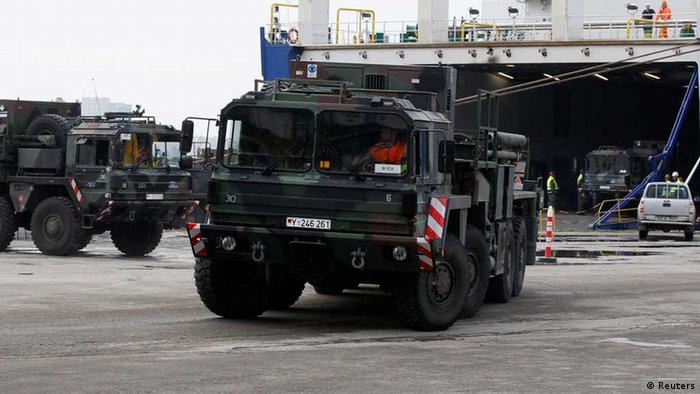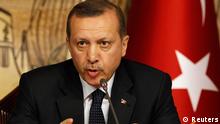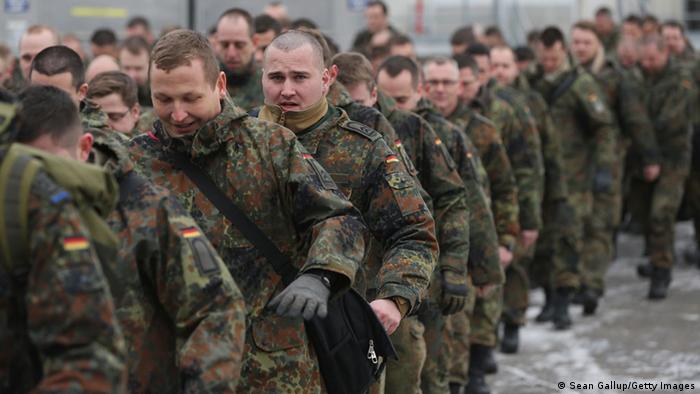http://www.dw.de/why-were-german-soldiers-attacked-in-turkey/a-16547390were German soldiers 'attacked' in Turkey?
 German Patriots arrived at Iskenderun's port in early January
German Patriots arrived at Iskenderun's port in early January
 Erdogan is facing a presidential election next year
Erdogan is facing a presidential election next year
 In Berlin, 240 German soldiers board a plane for Turkey's border - and Erdogan wants them home ASAP
In Berlin, 240 German soldiers board a plane for Turkey's border - and Erdogan wants them home ASAP
However, analyst Yesilada said he expects Ankara to eventually comply.
"The United States will first try to convince Ankara to unilaterally stop this. If that is not working, we will see rising pressure that paralyzes those [who] in any way intermediate or help intermediate this trade," he said.
Until now Ankara has largely complied with U.S. measures against Tehran. But Ankara still has to pay its bill for Iranian gas. Analysts point out that diversifying Turkey's energy dependency on Iran takes time and can be expensive. This month, Turkey signed a $12 billion deal with an Abu Dhabi company to develop the use of coal in energy production.
But Jamshid Assadi, an expert on Iran at France’s Burgundy Business School, said there are short-term alternatives to gold for Ankara to pay Tehran.
"One of the solutions for Iran, and they did that mainly with India, was that 'We sell you oil and you cannot pay us back so we do barter: you give us your products, whatever we need,'" Assadi said.
A senior Turkish official, who spoke on condition of anonymity, confirmed that Ankara was looking into bartering as a means of continuing to trade with Iran. Experts point out bartering has an added bonus for Turkey. Any products it barters will be locally produced, unlike gold, which it has to import.
Bartering could also help allay security concerns, said Yesilada."The problem now is neither Ankara nor Washington knows what Iran is using its gold for; it might be buying grain or other necessities, or maybe financing Assad’s forces [in Syria] or Hezbollah in Lebanon in... some terror acts," he said. "With barter, that is completely eliminated from the equation."
With more than 2,000 Iranian companies operating in Turkey, there already is a business network that could facilitate large-scale bartering.
With further sanctions against Iran possible, pressure is expected to grow on Turkey to lessen its energy dependence on Iran. Analysts think that process might accelerate with Tehran and Ankara increasingly at odds in the region, in particular over Syria.
The recent attack on German soldiers by a group of Turkish nationalists in Iskenderun reveals the distrust some Turks feel toward the West, NATO and the US. It seems likely that more protests will follow.
For the German soldiers deployed in Turkey to work on Patriot missile installations, there's good reason to feel a bit confused. First the Turkish government demanded the assistance of NATO allies to defend itself against potential rocket attacks due to the turmoil in neighboring Syria.
Yet barely had German soldiers set foot on Turkish soil when they were met by protests and physical attacks by Turkish citizens. For weeks now, a colorful smattering of political groups, made up of nationalists, communists and Islamists have been protesting against the installation of Patriot missiles in Turkey. The attack on German soldiers in Iskenderun this week was the culmination of those demonstrations.
 German Patriots arrived at Iskenderun's port in early January
German Patriots arrived at Iskenderun's port in early January
"We're going to fight until NATO soldiers are driven out of our country," said Cagdas Cengiz, vice chairman of the Turkish Youth Union (TGB), a left-wing nationalist group, during a demonstration in front of the German consulate in Istanbul, shortly after the attack on the German soldiers.
"We warned you," Cengiz said to the Germans. "But you didn't listen."
Sacks as a symbol
In Iskenderun, under the leadership of TGB Chairman Ilker Yücel, members of the group surrounded plainclothes German soldiers, insulted them and then attempted to stuff sacks over their heads. By using sacks, nationalists were playing on an incident that took place after the US invasion of Iraq in 2003. At that time US troops in northern Iraq arrested Turkish soldiers and placed sacks over their heads. Turkish nationalists have yet to forgive that incident.
The shape the protests have taken has made it clear that the German army has stepped into storm of aggressive anti-Americanism - a sentiment which, according to surveys and statements by experts, is widespread. Anti-American attitudes, says Füsun Türkmen, a political scientist in Istanbul, have a firm grip on Turkish society. A Lieutenant Colonel from the German military, Frank Sarak, believes that "demonstrators confused the German soldiers with American GIs."
A tough spot for the German government
When the German Marshall Fund - an American policy institution that promotes cooperation between North America and Europe - conducted a survey on the popularity of the US in Europe and Russia a few months ago, Turkey came in at the bottom of the barrel. Only 34 percent of Turkish citizens have a positive impression of the US and just one in four would like to see Washington DC in a role of international leadership. Opinions were similar with regard to NATO. A mere 38 percent considered the alliance necessary; in the EU and US the number of NATO supporters is 20 percent higher.
 Erdogan is facing a presidential election next year
Erdogan is facing a presidential election next year
That didn't used to be a problem for the Turkish government under Prime Minister Recep Tayyip Erdogan. Erdogan gets along splendidly with US President Barack Obama. Turkish-American relations are better than they have been in a long time.
Yet should the protests against Ankara and its request for NATO troops spread further, Erdogan might be forced to have an emergency meeting with NATO allies. After the incident in Iskenderun, Ankara received strong warnings and criticism from the German government in Berlin.
Protests expected to continue
To date the Turkish protest movement remains small and confined to Turkey's political fringe. That said, the Turkish Youth Union has recently received the support of parliamentarians of the Republican People's Party (CHP), a social democratic party and the largest opposition force in the country.
With an election campaign just getting underway in Turkey - both a presidential election and parliamentary elections will take place in 2014 and 2015 - Erdogan's opponents will likely attempt to utilize anti-Western sentiment.
 In Berlin, 240 German soldiers board a plane for Turkey's border - and Erdogan wants them home ASAP
In Berlin, 240 German soldiers board a plane for Turkey's border - and Erdogan wants them home ASAP
As a result of the protests the Turkish government would like to rid Turkey of the Patriot missile batteries as soon as possible. When dangers from Syria ultimately subside, NATO weapons will leave the country "on the same day - and even the same hour," said Turkish Foreign Minister Ahmet Davutoglu.
Until that happens the Turkish Youth Union, which has already announced plans for further demonstrations, will continue to protest.
and.........
http://www.voanews.com/content/turkey-aids-iran-through-gold-trade/1590290.html
ISTANBUL — Banks in Turkey continue to send gold to Iran despite U.S. pressure to curb a booming gold-for-gas trade, which helps Iran skirt international sanctions.
This month, Turkish customs grounded a Turkish cargo plane en route from Ghana to Iran that was reportedly carrying a ton-and-a-half of gold.
Tehran has been accumulating huge amounts of the precious metal over the past year as a means of circumventing ever-tightening international financial sanctions over its nuclear enrichment program, which some nations fear is being used to develop a nuclear weapons' capability.
Turkey continues to provide the lion’s share of Tehran's demand for gold, said Attila Yesilada, of the Istanbul-based research firm Global Source Partners.
"Gold sales [to Iran] have been diversified through Switzerland and Abu Dhabi, but the annualized total for last year is something like $11 billion, most of it financed through the gold stock of Turkish people," Yesilada said. "This gold has become Iran’s main currency in terms [of] securing necessities from abroad."
Turkey's Deputy Prime Minister Ali Babacan confirmed last November that Tehran pays for the gold from the Turkish Lira payments it receives for its gas exports to Turkey. Iran sells 90 percent of its natural gas to Turkey, making it Ankara's second largest supplier after Russia.
To stem the flow of gold, U.S. President Barack Obama this month signed into law a ban on the sale of precious metals to Iran. But Turkey is not bound by the measure, said Turkish Foreign Ministry spokesman Selcuk Unal."Turkey only feels itself legally bound only by U.N. Security Council resolutions or sanctions adopted under Chapter Seven," he said.
This month, Turkish customs grounded a Turkish cargo plane en route from Ghana to Iran that was reportedly carrying a ton-and-a-half of gold.
Tehran has been accumulating huge amounts of the precious metal over the past year as a means of circumventing ever-tightening international financial sanctions over its nuclear enrichment program, which some nations fear is being used to develop a nuclear weapons' capability.
Turkey continues to provide the lion’s share of Tehran's demand for gold, said Attila Yesilada, of the Istanbul-based research firm Global Source Partners.
"Gold sales [to Iran] have been diversified through Switzerland and Abu Dhabi, but the annualized total for last year is something like $11 billion, most of it financed through the gold stock of Turkish people," Yesilada said. "This gold has become Iran’s main currency in terms [of] securing necessities from abroad."
Turkey's Deputy Prime Minister Ali Babacan confirmed last November that Tehran pays for the gold from the Turkish Lira payments it receives for its gas exports to Turkey. Iran sells 90 percent of its natural gas to Turkey, making it Ankara's second largest supplier after Russia.
To stem the flow of gold, U.S. President Barack Obama this month signed into law a ban on the sale of precious metals to Iran. But Turkey is not bound by the measure, said Turkish Foreign Ministry spokesman Selcuk Unal."Turkey only feels itself legally bound only by U.N. Security Council resolutions or sanctions adopted under Chapter Seven," he said.
However, analyst Yesilada said he expects Ankara to eventually comply.
"The United States will first try to convince Ankara to unilaterally stop this. If that is not working, we will see rising pressure that paralyzes those [who] in any way intermediate or help intermediate this trade," he said.
Until now Ankara has largely complied with U.S. measures against Tehran. But Ankara still has to pay its bill for Iranian gas. Analysts point out that diversifying Turkey's energy dependency on Iran takes time and can be expensive. This month, Turkey signed a $12 billion deal with an Abu Dhabi company to develop the use of coal in energy production.
But Jamshid Assadi, an expert on Iran at France’s Burgundy Business School, said there are short-term alternatives to gold for Ankara to pay Tehran.
"One of the solutions for Iran, and they did that mainly with India, was that 'We sell you oil and you cannot pay us back so we do barter: you give us your products, whatever we need,'" Assadi said.
A senior Turkish official, who spoke on condition of anonymity, confirmed that Ankara was looking into bartering as a means of continuing to trade with Iran. Experts point out bartering has an added bonus for Turkey. Any products it barters will be locally produced, unlike gold, which it has to import.
Bartering could also help allay security concerns, said Yesilada."The problem now is neither Ankara nor Washington knows what Iran is using its gold for; it might be buying grain or other necessities, or maybe financing Assad’s forces [in Syria] or Hezbollah in Lebanon in... some terror acts," he said. "With barter, that is completely eliminated from the equation."
With more than 2,000 Iranian companies operating in Turkey, there already is a business network that could facilitate large-scale bartering.
With further sanctions against Iran possible, pressure is expected to grow on Turkey to lessen its energy dependence on Iran. Analysts think that process might accelerate with Tehran and Ankara increasingly at odds in the region, in particular over Syria.
No comments:
Post a Comment